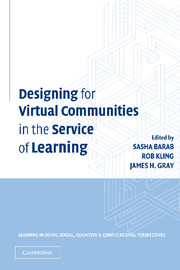Book contents
- Frontmatter
- Contents
- List of Contributors
- Series Foreword
- Foreword
- Preface and Acknowledgments
- In Memoriam
- PART I COMING TO TERMS WITH COMMUNITY
- PART II DESIGNING FOR WEB-SUPPORTED COMMUNITY
- PART III FOSTERING COMMUNITY/MEMBER PARTICIPATION
- 7 The Centrality of Culture and Community to Participant Learning at and with The Math Forum
- 8 An Exploration of Community in a Knowledge Forum Classroom
- 9 Co-Evolution of Technological Design and Pedagogy in an Online Learning Community
- 10 From Ambitious Vision to Partially Satisfying Reality
- PART IV RESEARCHING ONLINE COMMUNITY
- Index
- Titles in the series
- References
7 - The Centrality of Culture and Community to Participant Learning at and with The Math Forum
Published online by Cambridge University Press: 05 June 2012
- Frontmatter
- Contents
- List of Contributors
- Series Foreword
- Foreword
- Preface and Acknowledgments
- In Memoriam
- PART I COMING TO TERMS WITH COMMUNITY
- PART II DESIGNING FOR WEB-SUPPORTED COMMUNITY
- PART III FOSTERING COMMUNITY/MEMBER PARTICIPATION
- 7 The Centrality of Culture and Community to Participant Learning at and with The Math Forum
- 8 An Exploration of Community in a Knowledge Forum Classroom
- 9 Co-Evolution of Technological Design and Pedagogy in an Online Learning Community
- 10 From Ambitious Vision to Partially Satisfying Reality
- PART IV RESEARCHING ONLINE COMMUNITY
- Index
- Titles in the series
- References
Summary
In this chapter, the terms culture and community are problematized, and their centrality to participant learning at and with The Math Forum (mathforum.org) is discussed. Culture, as it is used here, refers to the rituals and norms that come to be associated with a site and its functioning. Community describes recognition of connections to and identification with other participants.
The Math Forum is an interactive and inquiry-informed digital library, or virtual resource center, for mathematics education. Previous chapters have addressed the ways in which The Math Forum has leveraged the concept of community in order to become a dynamic and resource-rich educational site (Renninger & Shumar, 2002; Shumar & Renninger, 2002). In the present chapter, this analysis is taken a step further. The culture of The Math Forum is described as providing its participants with a unique set of opportunities for learning and for making the relationship between the individual and the community one in which individual and community needs can both be met. Site culture enables contributions from individuals that by definition help to build out and sustain this community.
Math Forum participants include Math Forum staff members and a mix of teachers, students, and other individuals such as parents, software developers, mathematicians, math educators, professionals, and tradespeople, many of whom also volunteer their time as mentors for the site. Participants differ not only in terms of their roles, but in their experience, level of expertise, and interest for mathematics (Renninger & Shumar, 2002).
- Type
- Chapter
- Information
- Designing for Virtual Communities in the Service of Learning , pp. 181 - 209Publisher: Cambridge University PressPrint publication year: 2004
References
- 24
- Cited by



